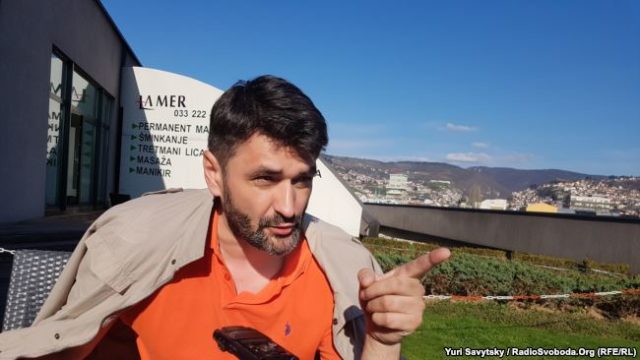
Moscow Using Serbs Against Bosnia as It Did Ethnic Russians Against Ukraine
Publication: Eurasia Daily Monitor Volume: 15 Issue: 60
By:

Many Western analysts have focused on the ways Moscow is seeking to use ethnic Russians and Russian-speakers in the former Soviet republics to expand the Kremlin’s influence—both by actually destabilizing these countries or simply raising the specter that it could repeat there what it has been doing in Ukraine since 2014. But fewer have considered that Moscow is pursuing a similar strategy in the Balkans by using Serbian groups allied with Russia. In particular, these tactics are targeting Bosnia-Herzegovina and seeking to further destabilize the broader region in order to try to block the enlargement of Western institutions like the European Union and the North Atlantic Treaty Organization (NATO).
Two decades ago, Moscow did much the same thing as Yugoslavia came apart, relying on the Serbs until it was countered by the West (Paul Goble, “Dangerous Liaisons: Moscow, the Former Yugoslavia and the West” in Richard Ullman, ed., The World and Yugoslavia’s Wars, 1996, pp. 182–197). That experience has largely been forgotten by the West, but not by Moscow, as the US-based Foreign Policy Research Institute points out in a new report. One of its co-authors, Emir Suljagic, recently discussed the nature and implications of Russian involvement of this kind for the Balkans and for the West in an interview with Radio Liberty (Krymr.com, April 18).
Suljagic, a rare survivor of the ethnic cleansing the Serbs carried about against the Bosnian Muslims and the author of the internationally acclaimed memoir about that tragedy, Postcards from the Grave, said that “the Kremlin wants to begin a conflict ‘in the Ukrainian style’ in Bosnia-Herzegovina” and to that end has been training police and paramilitary groups from the [Republika Srpska within Bosnia-Herzegovina] in Russia and providing them with weapons. This “militarization of the Serbian police,” Suljagic asserted, is “transforming them into an army.” If Moscow is able to use this client force, “Europe will pay a high price,” something that few now appear to recognize (Krymr.com, April 18).
Many of the leaders of Republika Srpska, just like some ethnic Russians in Ukraine prior to 2014, have close ties not only with Russia but with Vladimir Putin personally. And some of the Bosnian Serbs, just like some of Ukraine’s ethnic Russians and pro-Russian Ukrainians, meet with the Kremlin leader on a regular basis, Suljagic alleged. That should be generating concern in the West, he argued; but up to now, “the Euro bureaucrats do not have a political plan to prevent the escalation of the conflict in the Balkans.” Indeed, they do not appear to be concerned about this danger at all, an unfortunate repetition of European views on the eve of the Crimean annexation.
According to Suljagic, “the Russian plan” involves lighting a new fire in southern Europe and ensuring that it burns as long and as widely as possible. It may be that local Bosnian Serbs want only an independent Serb Republic, he said; “but the goal of the Russians is to begin a conflict here that will last for many years by repeating the scenario it has applied in Ukraine or the Transnistria region [in Moldova].” Not only will that distract Europe, he suggested, but it will give Moscow “an additional card to play when it sits down for talks with the leaders of the EU and the United States.”
What Moscow is doing in Bosnia-Herzegovina is also connected with Ukraine in another way, the analyst continued. “At a minimum, several hundred volunteers from Serbia and Republika Srpska are today fighting in Donbas against the Ukrainian state,” acquiring the kind of combat experience that they can use at home in the Balkans. This continues a larger tradition. Some of the Russians now involved in fighting in Donbas for Moscow “at one time fought in Bosnia on the side of the Serbs where they killed the local Muslim population.” Among them was Igor Girkin, “known under the pseudonym ‘Strelkov.’ ”
Suljagic recounted that what he saw in 1992 in his home republic recalls “the methods of aggression used by Russia in 2014 against Ukraine.” “I saw ‘little green men’ ” at that time in the city of Bratunac, he told his interviewer. Some of them came without any identifying marks on their uniform, just as was the case during the Russian intervention in Crimea. “True, their commanders were not ‘the Girkins,’ but rather [Dragoslav] Bokan and [Vojislav] Šešelj [Bosnian Serbs associated with the founding of the ethnic-Serb paramilitary group White Eagles]”; but they followed the same playbook, one shared by the KGB, the Federal Security Service (FSB) and the Serbian special forces. The only difference then and now, Suljagic insisted, is their “geographic location.”
The West needs to recognize this commonality, he concluded, and see that Putin is using his “hybrid” techniques not only in the former Soviet space but in the Balkans as well. The application of this technique in the fragile former Yugoslavia could easily harm even more people as well as more directly affect the interests of Europe and the United States.



